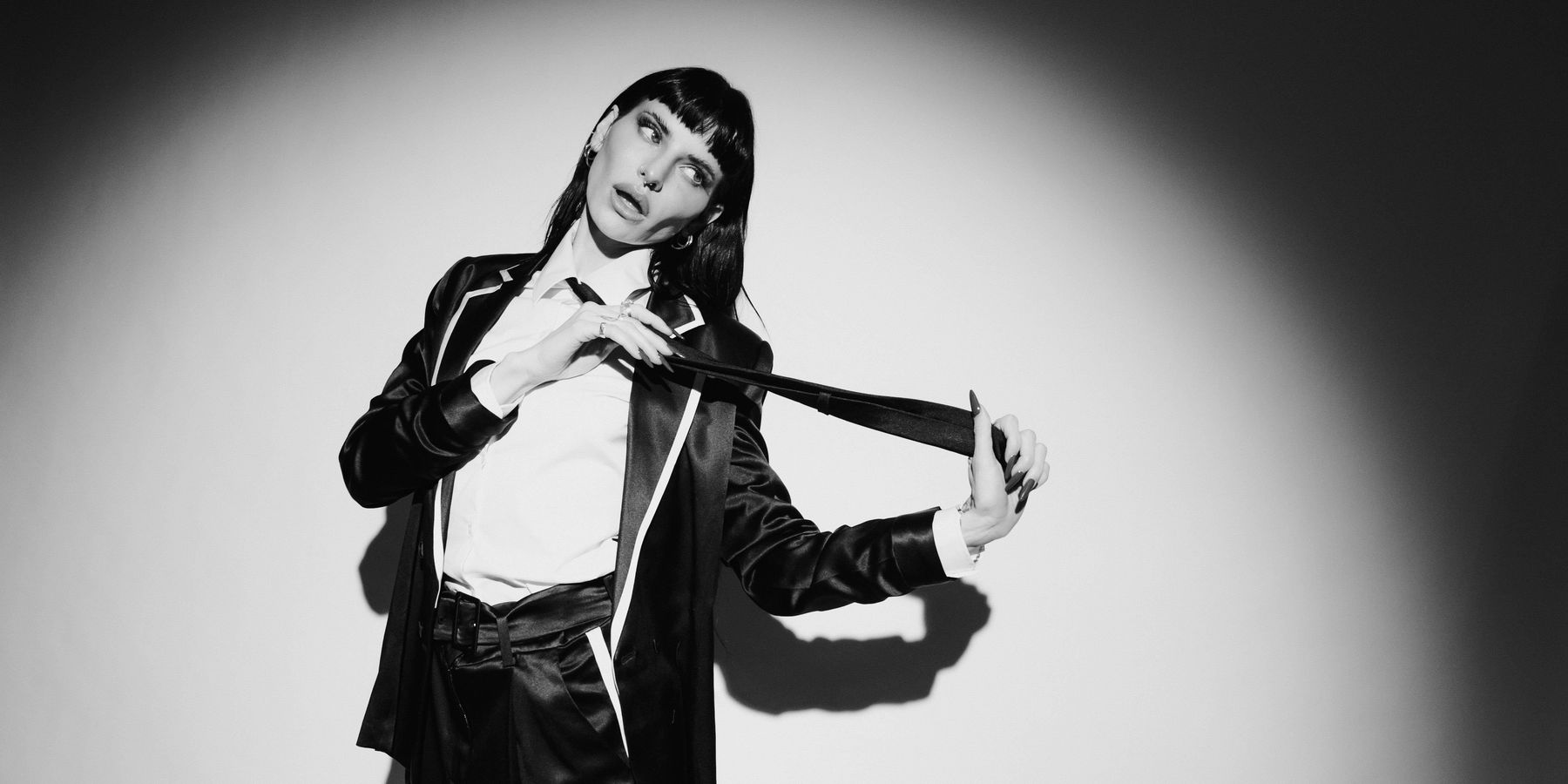
"I am Lilith Czar," begins the artist formerly known as Juliet Simms on her new album's "Poem Intro." The rock star's voice is calm — a bit too calm — before continuing with background and explaining how she was "created from filth and dust." With a heavy drum beat and absolute searing guitar, the word "dust" is screamed through her raspy, devilish vocals, as we're sent flying down the rabbit hole of reinvention.
Juliet Simms has officially been traded out — well, killed, actually — for Lilith Czar, and her forthcoming full-length effort, Created From Filth and Dust, details a story of becoming. Where Juliet never found her sound and wrestled for years with personal demons like addiction, Lilith knows exactly who she is and can now soberly claim her own space as a woman, a musician and a king.
"Lilith" refers to the Legend of the First Woman. Where Eve was created from Adam's rib and therefore perceived to be lesser than him, Lilith was born his equal and created from the same exact earth (or "filth and dust"). But if Adam was considered a king, why wasn't Lilith? "Czar," then, is the musician's reclamation of this story by putting Lilith in her rightful position on the throne centuries later.
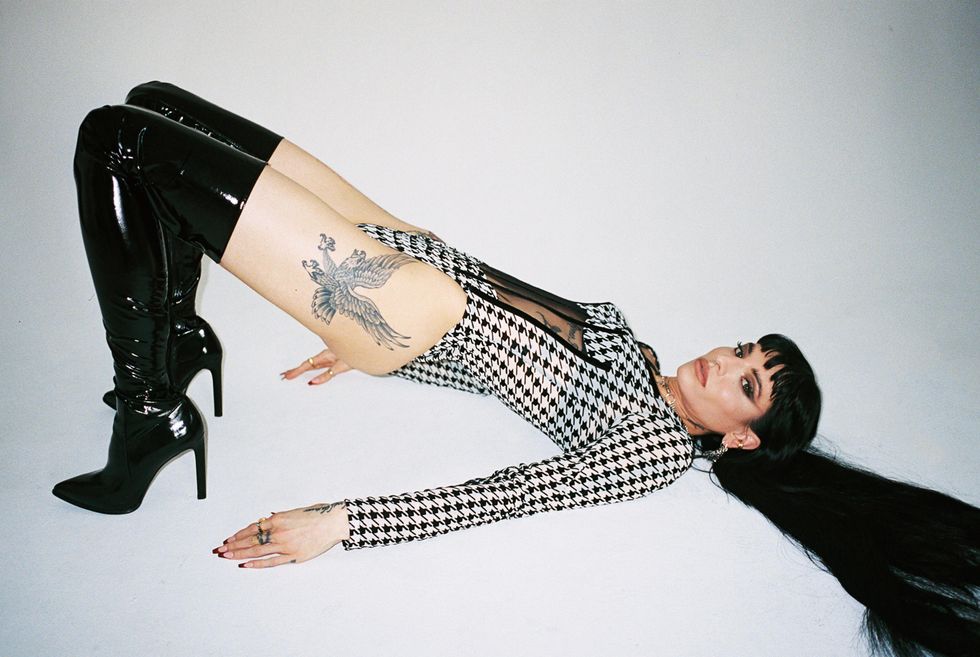
For the Created From Filth and Dust album art, Lilith Czar is shown wearing only a massive crown — the perfect visualizer for her new single, aptly titled "King." On its chorus, she makes a confident declaration: "If it's a man's world, I wanna be king/ If it's a man's world/ Don't wanna be queen." Like Lilith returning for revenge, "King" resets her origin story for 2021 as she gets the final word: "You built the castle, but I rule over me."
The unapologetic track, with its ferocious rock 'n' roll energy and crisp, clean production, premieres today through a music video that unfurls the musician's rebirth even further. She's shown at the height of creative freedom, shapeshifting throughout the nature-driven clip. From a bare-faced woman of the desert to one that connects more deeply with the ocean, the world is Lilith Czar's. "Don't you know the woman I am?" she sings, her voice wailing as if it'd send asteroids to earth.
Below, PAPER caught up with Lilith Czar to dive deeper into Created From Filth and Dust, out April 23 and available for pre-order.
You've not only changed your name, but also quite literally killed off Juliet Simms in the "All American" music video. Why do you not relate to that person anymore?
For a long time as Juliet Simms, I didn't know who I was. I spent many years trying to discover my opinion, my voice, what I wanted to say, who I wanted to be, what I wanted to look like. There's many iterations of Juliet Simms trying new things, trying new looks. I spent so much time not knowing who that was and it coincided with living in my own hell. I had a lot of demons to face, things to overcome and personal issues that I eradicated, thankfully, but it took years and it was definitely something that was brought about from being in this male-dominated, hard fucking industry.
You've been working in the music industry for such a long time.
My first record deal when I was 15 and I was thrown into the rock scene, which was a man's world. Women weren't really invited, and if you were a woman and you wanted to be in it, you had to fucking fight tooth and nail every day proving yourself, dealing with people telling you who they thought you were, what you should be, how you should dress, speaking to you differently than they speak to other people, not being treated the same. I didn't really recognize it, it was just the way it was: They think I'm a bitch because I'm a girl. I have to apologize for things because I'm a girl. I have to be Miss Perfect.
After years of experiencing that, I didn't really realize until later on how much that affected me. I've always prided myself in being somebody who could withstand or overcome anything and I've always felt like I was a very strong woman. So I feel like I buried a lot. I just didn't look at it and brushed it aside. Whatever, whatever, whatever, just throwing it under the carpet.
"Lilith represents ultimate female strength and outspokenness and rebellion and going against the norm."
How long were you able to brush things aside before those feelings exploded?
It all came to head in 2013-2014 when I really hit rock bottom. I had to decide: Am I going to carry on down this path of my own hell, or am I gonna crawl back out and have my own Phoenix moment? It's been about two years really, working on myself, my issues and my self-development, both physically and spiritually. I found myself at the end of it, shedding my former self in the last two to three years. I look back at Juliet Simms and it's as if I'm remembering a movie I watched. It's like a different lifetime ago.
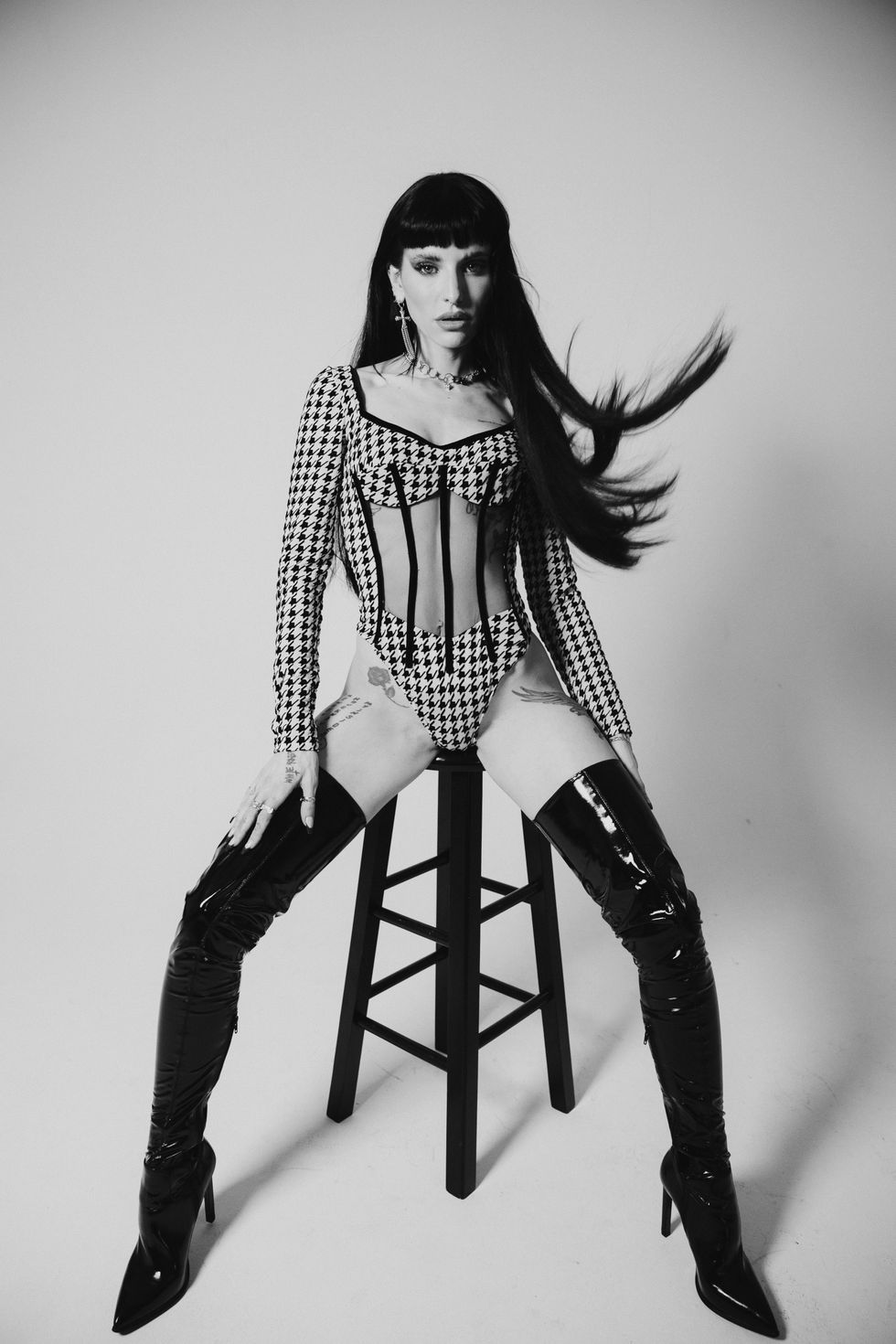
How has your sobriety impacted this journey?
I just finished reading Me by Elton John, which is the autobiography he put out. When he started talking about how somebody's personality can completely change when you become sober, I started laughing because it's so fucking true. You are born into this world as a free spirit and you're carefree and you don't have issues. Then you're released into the world and it just attacks you. Nobody can really be prepared. You have to let it happen, and you have to fall down and stand back up. Those experiences build your character and your tough skin and what you're able to endure. After the shit I have been through, I stood back up the last time and smacked the world and said, "Not again." That moment for me is where I became fearless, and Juliette Sims wasn't fearless. She was timid, introverted and afraid.Lilith Czar, then, is your new and fearless identity.
Lilith Czar, for me, is a story of the first woman to ever have been on Earth. She predates Eve, but she was born and made from the same dirt, filth, dust, ground and earth that Adam was, and because of that, she felt she was his equal. She was made to serve Adam, but she wouldn't submit to him, so he kept her out of Heaven and sent her to Hell. That fearlessness, that, "Fuck you, I'm not going to submit even if you send me to hell," is such an inspiring story. Being sent to Hell for having an opinion and being rebellious and outspoken and her entire story was one that I resonated with, more than any character I've read or seen. Lilith was a hero.
When did you realize you connected more with Lilith than Juliet?
It was last year, when everything stopped, and I had the time to really slow down, think a little too much. For the last couple of years, I've felt this confidence and strength in myself that I haven't felt since I was a little girl. Except now, it came with wisdom and experience. It dawned on me last year that I had shed the skin of my former self. I had become something else, but I didn't know for the last three years what was missing. I was so happy, content and fulfilled that something felt like it was missing, and last year was when it dawned on me, "Holy shit, what's missing is Juliet Simms." Done. That's what is gone. And so, this rebirth is, in essence, a very dramatic way of saying, "I have risen from the ashes and I'm a new woman."
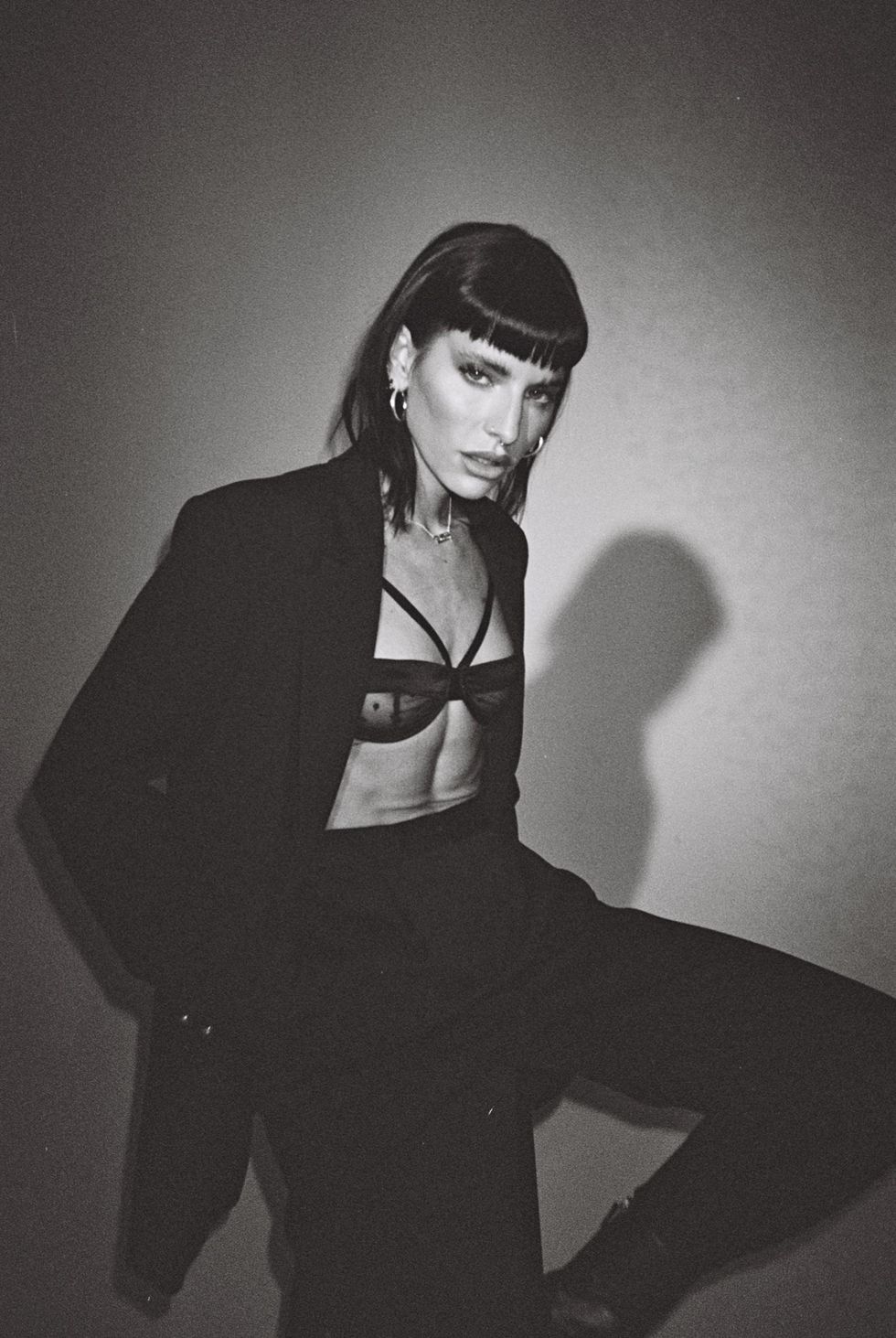
This is a fairly high-concept rollout and release. How did you plan to publicly make this transition?
Personally, I didn't want to leave fans in the dust just like, "Okay, bye." I wanted to create a story. I wanted to create something that would inspire them, that can help make them feel like they were also transforming, not just me. It's not just a selfish thing, I want you to find your Lilith Czar, as well. I was working on the Descent EP with John Feldmann, and we were coming up with the whole Lilith Czar thing at the same exact time. One day I was like, "I need to make a music video and kill Juliet Simms for good in it."
I don't know what it is, but every other music video I'm dying. I have a video, "End of the World," where I get hit by a car; "100 Little Deaths" by literally fighting my demons, and "100 Little Deaths" ends on a cliffhanger, so I was like, "I can connect '100 Little Deaths' to 'All American.'" If you actually watch the video, I put little Easter eggs all over. So that's what I wanted to do. It was like, We got to kill Juliet for good and that will start the rise of Lilith Czar. Then I came up with the EP title, Descent. That helped tell the story and the narrative of this fall and rise, and so that's why I connected it that way.
"This rebirth is, in essence, a very dramatic way of saying, 'I have risen from the ashes and I'm a new woman.'"
For a while, the only clip on your Instagram was of you burning alive with the caption, "The end is the beginning." How have you been using social media to tell this story?
It basically follows what happens after I am burned alive. Where did Juliet go? This story that I'm telling with the tarot cards and these images of me in purgatory with the mirror is a very poetic way of saying I died for the things I believed in. Now I'm transforming, now I'm becoming better, now I'm recapturing my power and rising. I wrote this whole poem, which is Lilith Czar's origin story and is actually what opens the album. Following that is the first single and the music video for "King."Why did you want "King" to be the first official statement of your new album?
Going back to the origin story of Lilith, she was born equal to man. If Adam was born a king, why wasn't she born a king? Why does she have to be in a lower status? Does it have to be a different name? Lilith represents ultimate female strength and outspokenness and rebellion and going against the norm. Then blending that with a name like Czar, Czar means king. It's the perfect culmination of femininity and masculinity and equality. Putting out the single, "King," it tells the story right off the bat. It puts out what she stands for.
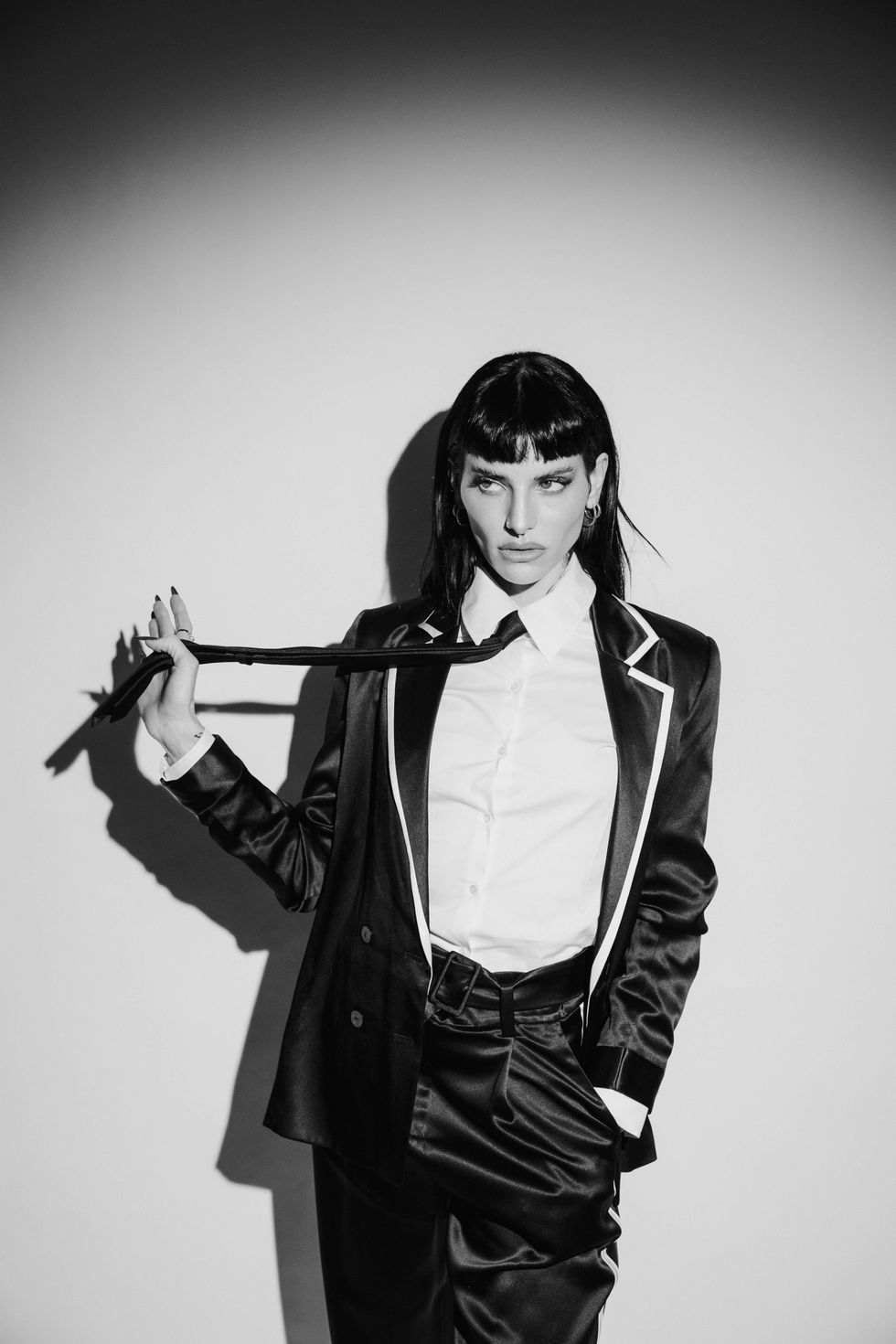
You've been through so many different chapters of your career. Does this new music feel like the most true to form of anything you've released?
Absolutely. I spent, basically up until a couple years ago, my entire life in the music industry trying to find what my sound was. That's the number one thing to overcome in this industry: How can you be the thing that nobody else is? What makes you special? What is it that makes your music recognizable? That's been something I've been trying to discover, but aside from my voice which is very distinct, the music was where I really struggled.
When I got into the studio with Scott Stevens, my producer, he found me at the end of 2018. When we started working together, that's the first thing he said: "The thing we're going to have the most trouble finding, and it's going to take a long time, is your sound. We have to hash that out, we have to nurture that. It's going to take patience." He was not wrong. It was a two and a half year project, and a fucking emotional rollercoaster.
Song after song, after song, after song, just recording and traveling, and going to Nashville and coming back and going to Nashville again, and coming back and writing with this person, writing at night, writing in the morning, writing in the middle of the night, just trying and experimenting.
When did you realize you were onto something?
We finally hit on something when we wrote "Bad Love." We were like, "This is kind of interesting, this has got a slinky-snaky Stevie Nicks vibe to it." We started going down that route a little bit more, and then we got "100 Little Deaths" and I was like, "This is really cool, we're getting there." I think this album represents my spirit and my soul, more than any body of work I've ever put out. I've never been more proud of any body of work than I am with this album.
This new music is rock, but with a bit of a glossy pop sheen. Did you intentionally want to bridge the gap between these two genres?
Absolutely. If you look up pop music from the late '50s to mid '70s, it's the Beatles, the Rolling Stones. Pop used to be rock, it was just not popular. I feel like through the evolution of music, we've all just agreed that pop music meant very produced, electronic, vanilla-type music. Not to say pop music is vanilla, but it's not rock 'n' roll. Don't get me wrong, I love pop music. I love my Dua Lipa, Miley Cyrus, Beyonce, Rihanna, Bruno Mars, but I think rock 'n' roll can also pop. It can have those elements of dance, where it makes you want to fucking run around your house and shake your hips.
There's nothing wrong with blending pop with rock. I just think, especially in my world in the rock scene, there's this unspoken head-butting between rock 'n' roll and pop, where it's almost this badge of honor being like, "I only listen to rock 'n' roll, I don't listen to pop," or people who love pop and are like, "Rock is stupid." It's this weird battle between the two genres, and I don't see that needing to be necessary anymore. We live in a world where everything is being blended. So yeah, my music has pop elements, but it's also rock 'n' roll and it's also alternative and it has some emo elements in it, and that's okay.
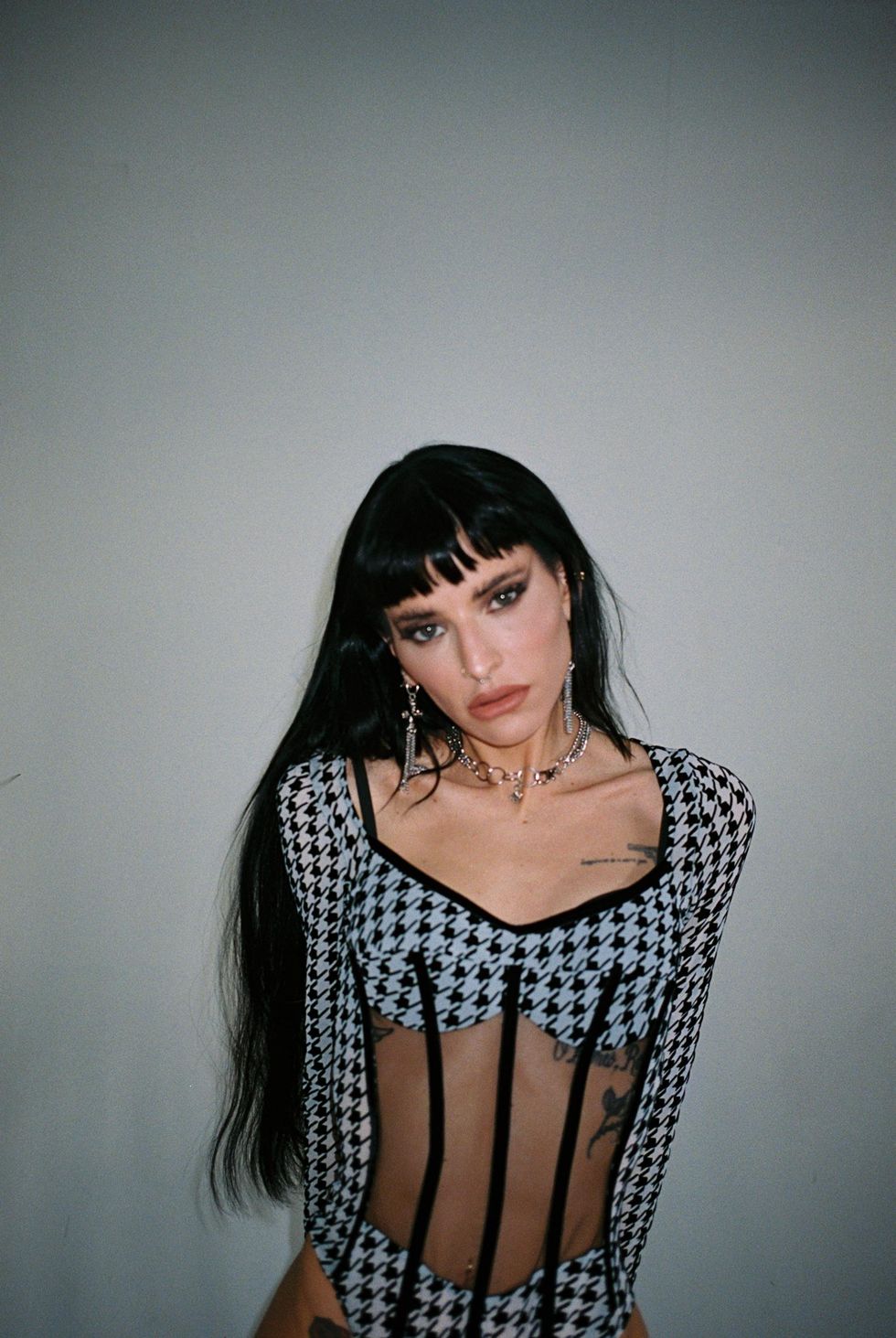
Speaking of Steve Nicks, you have an incredible "Edge of Seventeen" cover and it's the only cover on Created From Filth and Dust. How does it resonate with you?
Fleetwood Mac and Stevie Nicks played a heavy role in my life growing up. I grew up with the coolest hippie parents. I spent ages zero to 12 years old basically growing up on the beach. My dad and his brothers were surfers, and music was the number one thing in my life. It was Fleetwood, The Eagles, Rolling Stones, The Beatles, Simon and Garfunkel, Aretha Franklin. Stevie Nicks was the first female I can remember listening to and seeing, and I wanted to be her so bad. I wanted to sound like her. She was witchy and powerful and a goddess to me.
I listen to that song and feel like I'm five again. I feel like it's my song. I've been listening to it my entire life, and not to mention what it's about. It goes so beautifully with the narrative and story of my album. It's about time and life, and how precious that is — how life affects you, and how you grow from it and get stronger. I just felt it needed to be on my album, especially following the collapse.
"There's more of us than there are you, and we're fucking coming to take over, so get used to it."
There's a song called "Feed My Chaos" on your album. Do you consider yourself a chaotic person?
I certainly can be, absolutely 100%, I won't even deny it. I can get rattled real quick. I have a type of personality that when I get into something, I obsess over it. This probably comes back to the fact that I was an alcoholic. I have an addictive personality and now it goes into everything I do around me: My music, my work, when we photoshoots, the clothing, the fashion, the accessories, the hair, everything. I put so much thought into every small tiny little detail.
"Anarchy" feels especially relevant, right now, following a tumultuous political season. What's that song about?
Well, it should be noted that the song was written before 2020, and it was written from the standpoint of being a person who has experienced loss of subjugation and oppression, especially in the fields that I work in. It is a song for people who feel like they've been told, "No," or that they're weird or different. "This is what you should sound like, this is what you should look like, this is who I think you are," and being looked at differently. Walking on a plane, I've got a hundred tattoos on my body, and the looks that I get... You can have a problem with me, but keep it to yourself and go live your own cork-up-your-ass boring life. If we all stop judging each other and telling each other what you're allowed to do with your life, I feel like the world's problems would vanish significantly. That's what anarchy is, it's just like, "Fuck you." There's more of us than there are you, and we're fucking coming to take over, so get used to it.

"Created From Filth and Dust" Tracklist:
1. Intro Poem
2. Feed My Chaos
3. King
4. Anarchy
5. 100 Little Deaths
6. Lola
7. Edge of Seventeen
8. Bad Love
9. In My head
10. Unholy
11. Burn with Me
12. Diamonds to Dust
Photography: Ashley Osborn
From Your Site Articles
Related Articles Around the Web